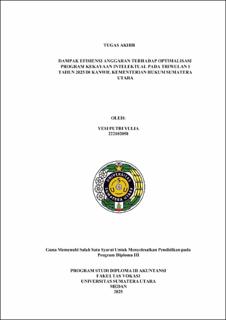Dampak Efisiensi Anggaran terhadap Optimalisasi Program Kekayaan Intelektual pada Triwulan I Tahun 2025 di Kanwil Kementerian Hukum Sumatera Utara
The Impact of Budget Efficiency on the Optimization of Intellectual Property Programs in the First Quarter of 2025 in the Regional Office of the Ministry of Law of North Sumatra

Date
2025Author
Yulia, Yesi Putri
Advisor(s)
Sembiring, Muhammad Simba
Metadata
Show full item recordAbstract
Background: Budget efficiency is a governmental policy aimed at enhancing the effectiveness of public fund utilization by emphasizing cost-saving measures without compromising performance outcomes. This policy was implemented nationally in 2025, coinciding with institutional restructuring that separated the Ministry of Law from the Ministry of Human Rights. This restructuring directly impacted the execution of public service programs, including the intellectual property program at the Regional Office of the Ministry of Law in North Sumatra. Objective: This study aims to analyze the impact of budget efficiency policies on the implementation of the intellectual property program at the Regional Office of the Ministry of Law in North Sumatra.
Methods: A descriptive qualitative approach was employed, utilizing data collection techniques such as in-depth interviews, participatory observations, and document studies.
Results: The findings indicate a significant decline in program budget realization, from 45.39% in the first quarter of 2024 to merely 10.98% in 2025. Several services, such as dissemination and education, were not executed, while mentoring and monitoring activities were conducted on a limited scale. Conversely, budget efficiency prompted a focus on priority programs and the utilization of digital technology, although these have not been fully implemented optimally.
Conclusion: The success of budget efficiency heavily relies on preparedness in planning, adaptive strategies, and cross-sector collaboration. It is recommended that the implementation of the intellectual property program be accompanied by strengthening human resource capacities, leveraging technological facilities, and conducting regular evaluations to ensure that efficiency aligns with the principles of high-quality and equitable public service delivery
Collections
- Diploma Papers [201]
